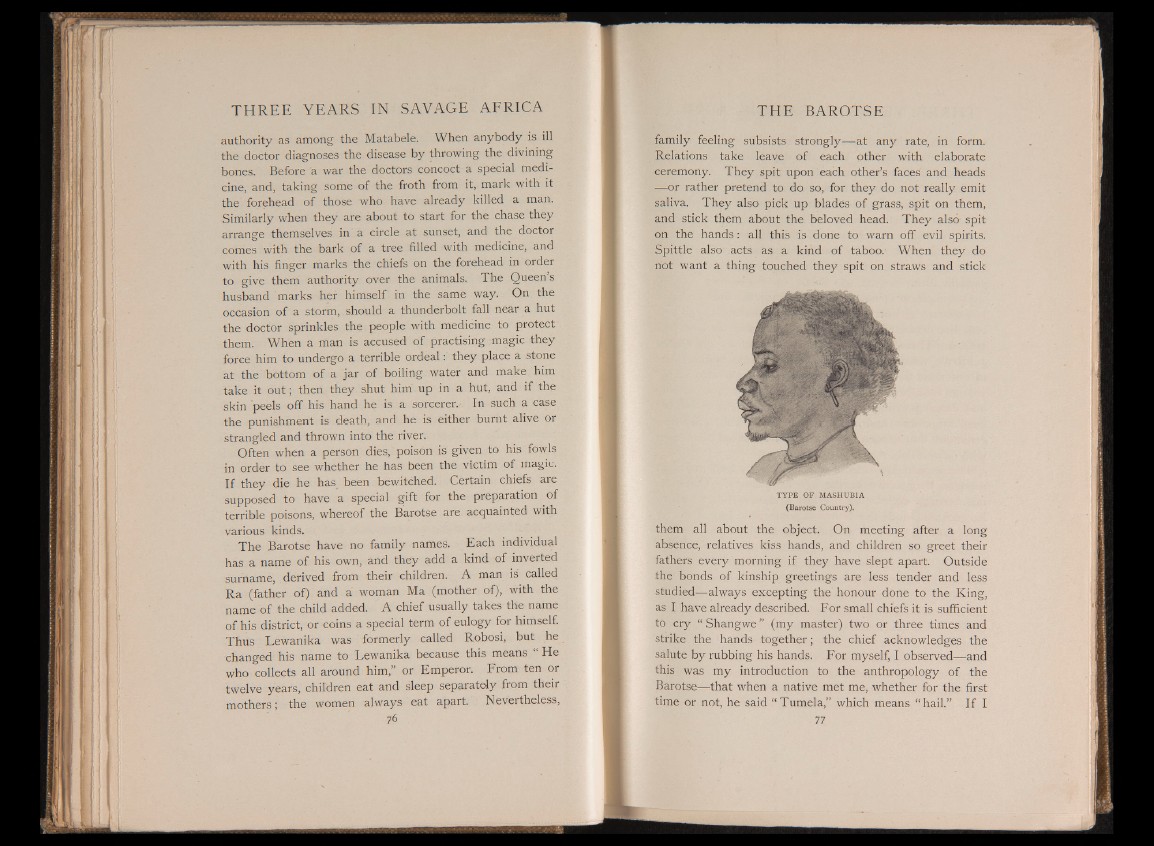
authority as among the Matabele. When anybody is ill
the doctor diagnoses the disease by throwing the divining
bones. Before a war the doctors concoct a special medicine,
and, taking some of the froth from it, mark with it
the forehead of those who have already killed a man.
Similarly when they are about to start for the chase they
arrange themselves in a circle at sunset, and the doctor
comes with the bark of a tree filled with medicine, and
with his finger marks the chiefs on the forehead in order
to give them authority over the animals. The Queen’s
husband marks her himself in the same way. On the
occasion of a storm, should a thunderbolt fall near a hut
the doctor sprinkles the people with medicine to protect
them. When a man is accused of practising magic they
force him to undergo a terrible ordeal: they place a stone
at the bottom of a jar of boiling water and make him
take it out; then they shut him up in a hut, and if the
skin peels off his hand he is a sorcerer.- In such a case
the punishment is death, and he is either burnt alive or
strangled and thrown into the river.
Often when a person dies, poison is given to his fowls
in order to see whether he has been the victim of rxiagic.
If they die he has been bewitched. Certain chiefs are
supposed to have a special gift for the preparation of
terrible poisons, whereof the Barotse are acquainted with
various kinds.
The Barotse have no family names. Each individual
has a name of his own, and they add a kind of inverted
surname, derived from their children. A man is called
Ra (father of) and a woman Ma (mother of), with the
name of the child added. A chief usually takes the name
of his district, or coins a special term of eulogy for himself.
Thus Lewanika was formerly called Robosi, but he
changed his name to Lewanika because this means He
who collects all around him,” or Emperor. From ten or
twelve years, children eat and sleep separately from their
mothers; the women always eat apart. Nevertheless,
76
family feeling subsists strongly—at any rate, in form.
Relations take leave of each other with elaborate
ceremony. They spit upon each other’s faces and heads
—or rather pretend to do so, for they do not really emit
saliva. They also pick up blades of grass, spit on them,
and stick them about the beloved head. They also spit
on the hands : all this is done to warn off evil spirits.
Spittle also acts as a kind of taboo.- When they do
not want a thing touched they spit on straws and stick
(Barotse Country).
them all about the object. On meeting after a long
absence, relatives kiss hands, and children so greet their
fathers every morning if they have slept apart. Outside
the bonds of kinship greetings are less tender and less
studied—always excepting the honour done to the King,
as I have already described. For small chiefs it is sufficient
to cry “ Shangwe” (my master) two or three times and
strike the hands together; the chief acknowledges the
salute by rubbing his hands. For myself, I observed—and
this was my introduction to the anthropology of the
Barotse—that when a native met me, whether for the first
time or not, he said “ Tumela,” which means “ hail.” If I
77